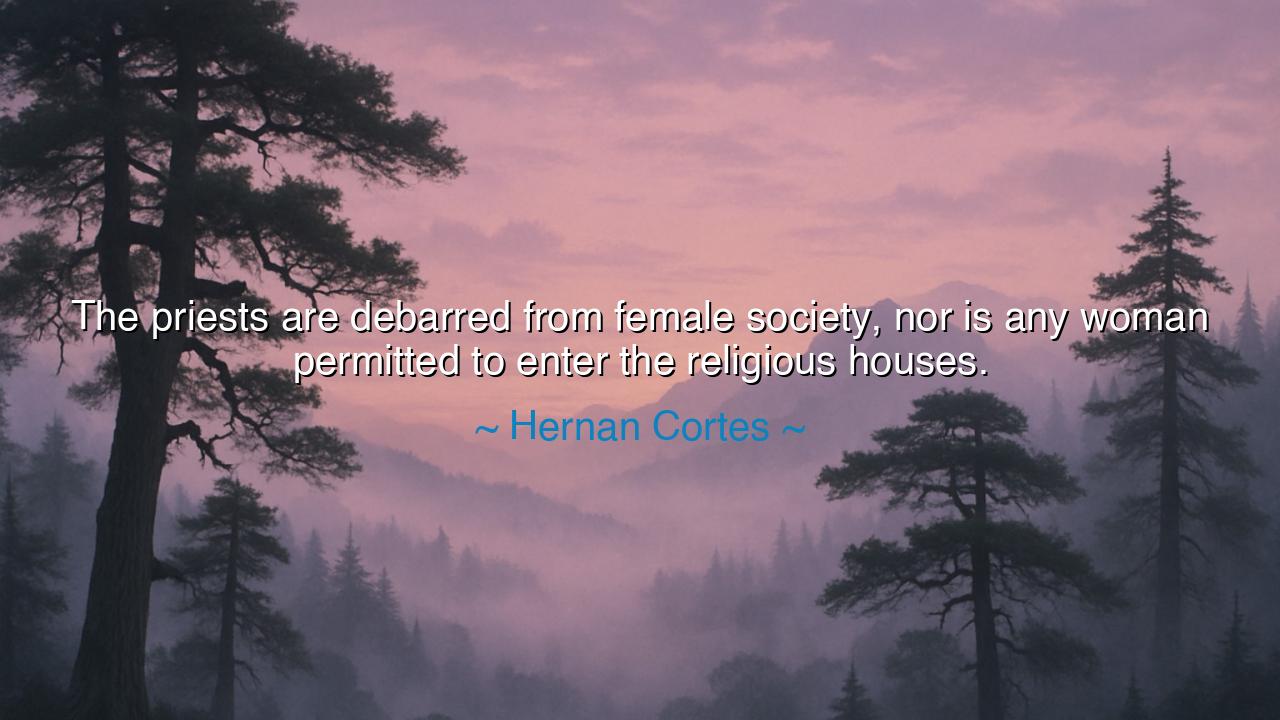
The priests are debarred from female society, nor is any woman
The priests are debarred from female society, nor is any woman permitted to enter the religious houses.






Hernán Cortés, the conquistador who gazed upon the temples and customs of the Mexica with both awe and ambition, once wrote: “The priests are debarred from female society, nor is any woman permitted to enter the religious houses.” These words were his attempt to describe what he saw in the New World, a world so different from his own that he recorded it with astonishment. Yet within this brief observation lies a window into how peoples across the earth have sought to shape their sacred lives—through discipline, through restriction, and through separation of the sexes in the pursuit of holiness.
The meaning of Cortés’s statement is twofold. On the surface, he simply describes the practice of certain indigenous priests, who lived apart from women and guarded the purity of their religious houses. But beneath it is a deeper truth, one known across civilizations: that men of the temple often withdrew from the bonds of ordinary life, fearing that attachment, desire, or distraction might pollute their vows. To be “debarred from female society” was not merely exile; it was thought to be discipline, a path to spiritual power and focus.
History shows this pattern again and again. In Christian monasticism, monks withdrew into cloisters where women could not tread, and nuns into convents where men were forbidden. In ancient Greece, the temple of Vesta was guarded by virgins whose lives were cut off from marriage and family, their purity believed to safeguard the city itself. In Buddhism, too, monks renounced worldly ties, dwelling apart to preserve their devotion. Thus the practice Cortés witnessed was not strange to the Old World—it was another branch of the same ancient tree, where the sacred was walled off from the profane, and where sexuality was seen not as gift but as danger.
Yet we must not take such customs without question. To forbid women from religious houses was also to deny them equal place in the shaping of the sacred. In many traditions, the exclusion of women from the highest roles of worship carved a wound into society, limiting half of humanity’s voice in the conversation with the divine. Cortés, in his chronicles, recorded without judgment—but for us, his words must stir reflection. For what is gained by purity, if it is bought at the price of exclusion? What is the strength of devotion, if it requires the silencing of another?
Consider how history shifted when such barriers were challenged. In modern times, as women entered seminaries, universities, and temples, the richness of the sacred was renewed. The voices long silenced began to sing again, bringing balance and breadth to traditions once bound by separation. What Cortés saw as rigid law, we can now see as one stage in the long evolution of human spiritual life—an evolution that calls us toward greater inclusion, while still honoring the discipline of devotion.
The lesson here is profound: discipline is essential for the sacred life, but it must never become chains that strangle the human spirit. Society thrives not when half its members are excluded, but when all are allowed to serve, to lead, to share in the shaping of truth. The ancients built walls around their holy places; perhaps they needed those walls in their time. But wisdom for our age is different: to tear down the walls, to recognize that holiness is not fragile but abundant, not threatened by inclusion but strengthened by it.
Practical action lies before us. Let us honor the dedication of those who chose celibacy and withdrawal, but let us also open our hearts to the truth that men and women alike bear the image of the divine. Support communities where every voice is welcome in worship. Question traditions that exclude without reason. Teach your children that the sacred is not diminished by diversity, but magnified by it.
Thus, let Cortés’s words be heard not only as record but as invitation: to reflect on the paths of the past, to respect the sacrifices of those who lived by strict rule, but also to strive for a society where devotion and equality walk hand in hand. For the divine is not the possession of one sex or another—it is the inheritance of all humanity. And when men and women together build the houses of the sacred, then truly will those houses stand unshaken through the ages.






AAdministratorAdministrator
Welcome, honored guests. Please leave a comment, we will respond soon